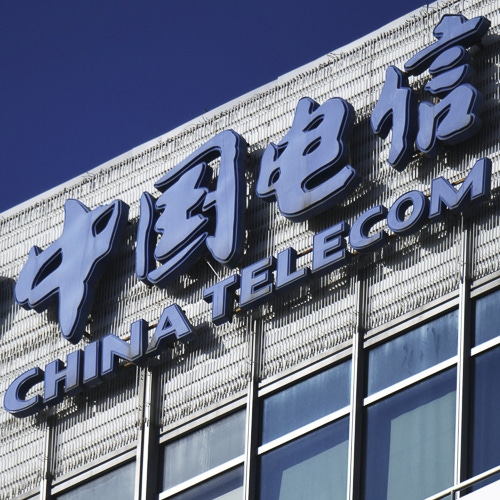China Telecom readies ChatGPT-style AI services
Chinese telco stocks have soared on the back of AI growth prospects.

The stunning debut of Open AI's ChatGPT has set off a mini-gold rush among Chinese investors.
Surprisingly, telecom operators have been among the leading beneficiaries – primarily due to the expectation that data-intensive AI services will rely heavily on the cloud platforms they have rolled out over the past two years.
The three telcos have all enjoyed double-digit stock price gains this year, China Telecom in particular. Its Shanghai stock is up 29% since January 1. That's because, besides being the biggest cloud provider among the telcos, it has also reported progress in developing its own generative AI content services.
Figure 1:  China Telecom has made generative AI content services one of its main R&D efforts.
China Telecom has made generative AI content services one of its main R&D efforts.
(Source: Newscom / Alamy Stock Photo)
Last week China Telecom said it achieved some initial research results from its large-scale AI model and had laid the foundation to developing its own version of ChatGPT, China Star Market reported.
The company said generative AI had been one of its main areas of research since mid-2022, with the aim of developing an industrial version of ChatGPT for its own use and for enterprise customers. It aims to synergize its new AI technologies with existing services, such as intelligent customer service and media functions such as video ring back tones and other audio.
China Telecom also said it would carry out independent R&D of AI core capabilities, focusing on digital human, metaverse, chatbots and other fields. The telco last year unveiled the results of a partnership with the Shanghai AI Laboratory, building China's first large-scale urban governance AI model with more than 1 billion parameters.
Authorities block ChatGPT
Meanwhile, Chinese authorities have moved to ensure the AI content business grows within its own tightly controlled local guardrails. The government is seeking to enforce a full ban on the ChatGPT service. Currently, the OpenAI site is not directly available from China but can be accessed either through VPN or mini-programs launched via WeChat. Regulators have now directed tech firms not to allow access via their platforms.
The move will have come as a surprise to very few. As one unnamed executive told Nikkei Asia, "Our understanding from the beginning is that ChatGPT can never enter China due to issues with censorship, and China will need its own versions of ChatGPT."
The government also requires that tech firms seek approval before launching their own versions of ChatGPT. The first to market looks likely to be Baidu, which says it is in the final stages of testing its Ernie chatbot. It has said it will integrate the chat function across its search, autonomous driving and other operations from next month.
Related posts:
— Robert Clark, Contributing Editor, special to Light Reading
About the Author(s)
You May Also Like












